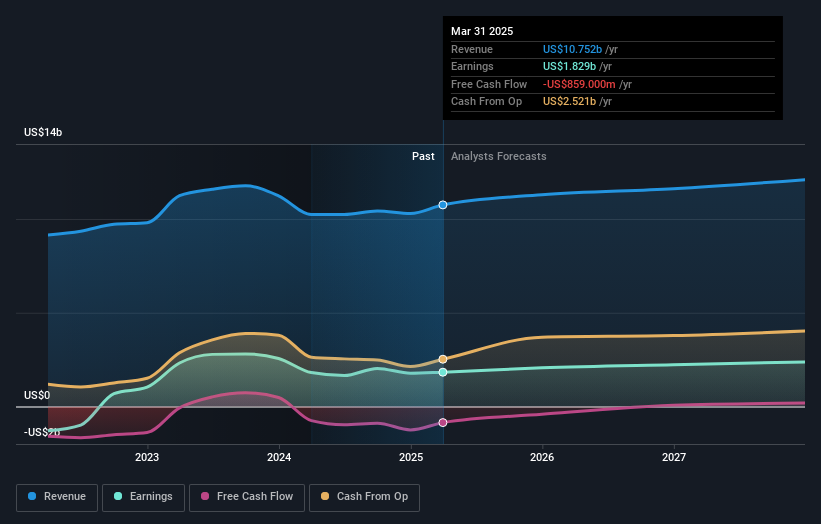
Public Service Enterprise Group Incorporated (NYSE:PEG) came out with its first-quarter results last week, and we wanted to see how the business is performing and what industry forecasters think of the company following this report. It was not a great result overall. Although revenues beat expectations, hitting US$3.2b, statutory earnings missed analyst forecasts by 18%, coming in at just US$1.18 per share. This is an important time for investors, as they can track a company's performance in its report, look at what experts are forecasting for next year, and see if there has been any change to expectations for the business. So we collected the latest post-earnings statutory consensus estimates to see what could be in store for next year.

Taking into account the latest results, the most recent consensus for Public Service Enterprise Group from 14 analysts is for revenues of US$11.3b in 2025. If met, it would imply an okay 5.0% increase on its revenue over the past 12 months. Per-share earnings are expected to increase 9.5% to US$4.02. In the lead-up to this report, the analysts had been modelling revenues of US$11.0b and earnings per share (EPS) of US$4.02 in 2025. So it looks like there's been no major change in sentiment following the latest results, although the analysts have made a modest lift to to revenue forecasts.
Check out our latest analysis for Public Service Enterprise Group
Even though revenue forecasts increased, there was no change to the consensus price target of US$86.57, suggesting the analysts are focused on earnings as the driver of value creation. That's not the only conclusion we can draw from this data however, as some investors also like to consider the spread in estimates when evaluating analyst price targets. There are some variant perceptions on Public Service Enterprise Group, with the most bullish analyst valuing it at US$102 and the most bearish at US$70.00 per share. As you can see, analysts are not all in agreement on the stock's future, but the range of estimates is still reasonably narrow, which could suggest that the outcome is not totally unpredictable.
Looking at the bigger picture now, one of the ways we can make sense of these forecasts is to see how they measure up against both past performance and industry growth estimates. The analysts are definitely expecting Public Service Enterprise Group's growth to accelerate, with the forecast 6.8% annualised growth to the end of 2025 ranking favourably alongside historical growth of 3.0% per annum over the past five years. By contrast, our data suggests that other companies (with analyst coverage) in a similar industry are forecast to grow their revenue at 5.1% per year. Factoring in the forecast acceleration in revenue, it's pretty clear that Public Service Enterprise Group is expected to grow much faster than its industry.
The Bottom Line
The most important thing to take away is that there's been no major change in sentiment, with the analysts reconfirming that the business is performing in line with their previous earnings per share estimates. Happily, they also upgraded their revenue estimates, and are forecasting them to grow faster than the wider industry. There was no real change to the consensus price target, suggesting that the intrinsic value of the business has not undergone any major changes with the latest estimates.
With that in mind, we wouldn't be too quick to come to a conclusion on Public Service Enterprise Group. Long-term earnings power is much more important than next year's profits. We have estimates - from multiple Public Service Enterprise Group analysts - going out to 2027, and you can see them free on our platform here.
You should always think about risks though. Case in point, we've spotted 2 warning signs for Public Service Enterprise Group you should be aware of, and 1 of them makes us a bit uncomfortable.
Have feedback on this article? Concerned about the content? Get in touch with us directly. Alternatively, email editorial-team (at) simplywallst.com.
This article by Simply Wall St is general in nature. We provide commentary based on historical data and analyst forecasts only using an unbiased methodology and our articles are not intended to be financial advice. It does not constitute a recommendation to buy or sell any stock, and does not take account of your objectives, or your financial situation. We aim to bring you long-term focused analysis driven by fundamental data. Note that our analysis may not factor in the latest price-sensitive company announcements or qualitative material. Simply Wall St has no position in any stocks mentioned.